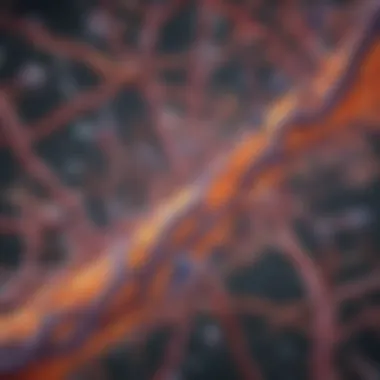Understanding the Digestive Gut: A Comprehensive Exploration


Overview of Research Topic
Brief Background and Context
The digestive gut is a critical component of human physiology. It encompasses a complex network of organs that process food and absorb nutrients. This system includes the stomach, intestines, pancreas, liver, and more. The gut is not only essential for digestion but also plays a significant role in overall health and immune function. Recent studies have highlighted the importance of gut microbiome, which consists of trillions of microorganisms that inhabit the digestive tract. These microbes influence digestion and overall well-being.
Importance in Current Scientific Landscape
Research on the digestive gut is increasingly relevant today. As global health issues, including obesity and inflammatory bowel diseases, rise, understanding the gut's functions becomes paramount. Current research focuses on how the gut microbiome interacts with the host to impact various health conditions. This field is dynamic and ever-evolving, making it crucial for scientists to keep pace with new findings and implications for treatment strategies.
Methodology
Research Design and Approach
To explore the digestive gut comprehensively, a systematic approach is necessary. This involves reviewing existing literature, analyzing recent studies, and synthesizing findings from various research methodologies, including clinical trials and observational studies. An integrative design allows researchers to gather insights on both anatomical structures and functional aspects of the digestive system.
Data Collection Techniques
Data collection in this area typically employs a range of techniques:
- Surveys and Questionnaires: Used to assess dietary habits and gut health among diverse populations.
- Microbiome Analysis: Sequencing techniques such as 16S rRNA sequencing provide valuable information about microbial communities in the gut.
- Clinical Trials: Evaluate the effects of interventions, like dietary changes or probiotics, on gut health.
Understanding these methods allows for a richer comprehension of the gut’s functionality and its impact on health outcomes. This article aims to compile these various strands of research to present a holistic view of the digestive gut.
Intro to the Digestive Gut
Understanding the digestive gut is essential for comprehending how our bodies convert food into nutrients. This section lays the groundwork for the entire exploration, emphasizing both structure and function. Our digestive system is not just about breaking down food; it plays a crucial role in overall health, immune function, and emotional wellbeing. It is a complex system that involves multiple organs working in harmony.
An important aspect to note is the relationship between the gut and the microbiome. The trillions of microorganisms residing in our digestive tract significantly impact digestion and nutrient absorption. More than just passive inhabitants, these microbes actively engage in biochemical processes that influence our health. The intricate balance maintained by these microbes underscores why a healthy digestive gut is vital.
Also, the article examines historical perspectives related to digestion to illustrate the evolving understanding of this vital process. The way ancient cultures viewed food and health differs from modern science, showing how perspectives can change over time. This historical insight enhances comprehension of contemporary digestive health approaches.
In essence, the following sections will further elucidate these essential details and build a complete picture of the digestive gut's functions and its importance to overall well-being.
Significance of the Digestive Gut
The digestive gut serves as the body's primary gateway for nutrient absorption and waste elimination. The efficiency with which it operates has a direct correlation with one's physical health. A well-functioning digestive gut aids in breaking down complex carbohydrates, fats, and proteins, transforming them into usable energy.
A healthy gut is also linked to improved immune function. Nearly 70% of the immune system resides in the gut, underscoring its critical significance. This structure helps in defending against external pathogens and maintaining a proper balance of gut flora.
Moreover, the state of the digestive gut can affect mental health, highlighting the gut-brain axis. Anxiety and depression have been associated with gut health discrepancies. Understanding these connections could lead to better mental health strategies in the future.
Historical Perspectives on Digestion
Looking back in history, various cultures have contributed to our current understanding of digestion. Ancient Egyptians recognized the importance of maintaining a balanced diet, markedly linking food consumption to health. Similarly, medieval scholars began documenting digestive processes, paving the way for further scientific investigations.
The shift toward a more scientific approach began in the 19th century. Researchers like William Beaumont conducted experiments that revealed detailed insights into digestion. Beaumont's studies provided foundational knowledge about gastric juices and their role in food breakdown, influencing dietary practices.
Today, the study of the digestive gut continues to evolve, integrating modern research into microbial interactions and genetic aspects of digestion. An awareness of this historical context provides insight into how far we have come in understanding the digestive system, as well as the potential for future discoveries that could revolutionize the field.
Anatomy of the Digestive System
The anatomy of the digestive system forms the foundation for understanding how food is processed in the body. Each organ plays a vital role in breaking down food, absorbing nutrients, and eliminating waste. A thorough comprehension of this anatomy is essential for grasping the complex interactions that occur during digestion.
The digestive system comprises several key organs, each contributing to digestion at different stages. An overview of these organs provides insight into their specific functions and their relationships with one another. This knowledge is critical for students, researchers, and professionals studying human biology and health. The intricate design of the digestive system allows it to maximize nutrient absorption and ensure efficient waste removal.


Organs Involved in Digestion
The journey of food through the digestive system involves different organs. Here is a list of the primary ones:
- Mouth: Begins the process of digestion through chewing and saliva production, which contains enzymes.
- Esophagus: A muscular tube that conveys food from the mouth to the stomach via peristalsis, a series of wave-like muscle contractions.
- Stomach: Mixes food with gastric juices. It is here that proteins begin to be broken down.
- Small Intestine: This is where most nutrient absorption takes place. It has three parts: duodenum, jejunum, and ileum.
- Large Intestine: Primarily responsible for water absorption and the formation of feces.
- Rectum: Stores feces until they are expelled, marking the end of the digestive process.
Each of these organs interacts with others to facilitate digestion. For instance, the small intestine relies on bile from the liver and pancreatic juices to continue the digestive process. Understanding these interrelationships helps clarify how disturbances in one area can affect the entire system.
Structure and Function of the Gut Walls
The walls of the gut play a crucial role in digestion and absorption. They are composed of four main layers: mucosa, submucosa, muscularis, and serosa. Each layer has distinct characteristics and functions:
- Mucosa: The innermost layer, lined with epithelial cells that facilitate nutrient absorption. It contains glands that secrete digestive enzymes and mucus.
- Submucosa: This layer contains blood vessels, nerves, and lymphatics, providing nutrients and signals to regulate gut function.
- Muscularis: Composed of smooth muscle, this layer is responsible for peristalsis, moving food along the digestive tract.
- Serosa: The outermost layer that provides protection and support to the surrounding tissues.
The structural design of gut walls is essential for effective digestion and absorption.
The coordinated contraction of the muscular layer facilitates the progressive movement of food, while the mucosa ensures optimal nutrient uptake. Any disruption in these layers can lead to digestive disorders, highlighting the importance of their integrity.
In summary, the anatomy of the digestive system is complex yet purposefully designed to optimize the digestion process. A deeper understanding of the organs involved and the structure of gut walls is paramount for advancing our knowledge of human health and disease.
Physiology of Digestion
The physiology of digestion plays a crucial role in understanding how our bodies process food. It involves various intricate mechanisms that not only break down food components but also enable the absorption of essential nutrients. By examining this, we gain insight into the efficiency and health of our digestive systems. Understanding these physiological processes equips students, researchers, and healthcare professionals with the knowledge necessary to address various digestive issues.
Stages of Digestion
Digestion unfolds in several stages, each crucial for the overall process. It begins in the mouth, where mechanical breakdown through chewing and enzymatic action of saliva commences. Saliva contains amylase, which begins the breakdown of carbohydrates. The food then travels down the esophagus, entering the stomach.
In the stomach, gastric juices, which include hydrochloric acid and pepsin, further break down proteins and kill harmful bacteria. The mixture of food and gastric juices forms a semi-liquid substance known as chyme. After several hours, chyme moves to the small intestine. Here, digestion continues with the help of digestive enzymes from the pancreas and bile from the liver. In the small intestine, nutrients are absorbed into the bloodstream. Finally, any unabsorbed matter proceeds to the large intestine, where water is reabsorbed, and waste is formed for excretion.
Digestive Enzymes and Their Functions
Digestive enzymes are the catalysts for the breakdown of food. They are specific in their action, targeting different macronutrients. For instance, amylase, as mentioned earlier, primarily digests carbohydrates.
Other key enzymes include:
- Proteases: Break down proteins into smaller peptides and amino acids.
- Lipases: Responsible for digesting fats into fatty acids and glycerol.
- Lactase: Helps in the digestion of lactose, the sugar found in milk.
The efficiency of these enzymes directly affects nutrient absorption. A deficiency in specific enzymes can lead to malabsorption and various digestive disorders. Therefore, understanding their roles is essential for addressing digestive health.
Absorption Mechanisms in the Gut
Absorption is the final critical step in the digestive process. It occurs mainly in the small intestine through several mechanisms. Nutrients can be absorbed through:
- Passive diffusion: This method allows small molecules like water and some vitamins to passively move across cell membranes without energy expenditure.
- Facilitated diffusion: This process involves carrier proteins facilitating the transport of substances down their concentration gradients.
- Active transport: This mechanism requires energy to move nutrients against their concentration gradient, critical for the absorption of glucose and amino acids.
The architecture of the intestinal walls significantly enhances absorption efficiency. Villi and microvilli increase the surface area, maximizing nutrient uptake.
In summary, understanding the physiology of digestion is key to grasping how food is processed in the body. Each stage, enzyme, and absorption mechanism contributes to the efficiency of digestive health, impacting our overall well-being.
"A well-functioning digestive system is fundamental to maintaining health and preventing disease." - Source unknown
For further exploration, interested individuals can consult resources at Wikipedia or Britannica.
The Microbiome: A Key Player


The gut microbiome plays a crucial role in human health and well-being. It consists of trillions of microorganisms, including bacteria, viruses, fungi, and protozoa that reside in the digestive tract. These microbes contribute to various essential bodily functions, making their study important in understanding the digestive system. This section will explore the composition of the gut microbiome, the functions of gut microbes, and the impact of diet on these communities.
Composition of the Gut Microbiome
The gut microbiome encompasses a diverse array of microorganisms, broadly categorized into beneficial and potentially harmful species. Bacteroidetes and Firmicutes are the most prevalent phyla, each contributing unique functions. Other important groups include Actinobacteria, Proteobacteria, and Fusobacteria. The balance of these microorganisms is essential for health. A diverse microbiome tends to be more resilient against disease. For instance, individuals with a high variety of gut bacteria generally show better metabolic health and reduced inflammation.
Understanding the composition of the gut microbiome can lead to significant insights into digestive health and treatment of various conditions.
Functions and Importance of Gut Microbes
Gut microbes perform several vital functions. They help in breaking down complex carbohydrates and fermenting fiber, producing short-chain fatty acids that provide energy to gut cells. Furthermore, these microbes play an integral role in synthesizing vitamins such as B vitamins and vitamin K. They contribute to the immune system as well; by stimulating immune responses, they help maintain a balance between immune tolerance and active defense against pathogens. The gut microbiome also has implications for mental health. Recent studies suggest that gut bacteria can influence mood and behavior through the gut-brain axis.
Impact of Diet on the Microbiome
Diet serves as the primary factor shaping the gut microbiome. A fiber-rich diet can promote the growth of beneficial bacteria and enhance microbial diversity. Foods such as fruits, vegetables, whole grains, and legumes support microbial health. In contrast, a diet high in processed foods and sugar can lead to dysbiosis, an imbalance in the microbiome that may contribute to digestive disorders and other health issues. Probiotics, found in yogurt and fermented foods, are another way to influence gut health by introducing beneficial bacteria. Similarly, prebiotics like inulin and fructooligosaccharides serve as food for these microbes, supporting their growth.
By recognizing the importance of the gut microbiome and how it can be influenced by our diet, individuals can take proactive steps in promoting their gut health, which ultimately supports overall health.
Influence of the Gut on Health
The gut plays a critical role in overall health. Modern research increasingly shows how the digestive system impacts various bodily functions. Understanding the influence of the gut on health is important for addressing numerous health issues. One significant area of interest is how gut health is connected to mental well-being, immune responses, and overall physical health.
Gut-Brain Axis: Communication Pathways
The gut-brain axis is a term used to describe the bidirectional communication between the gastrointestinal tract and the brain. This connection is mediated through various pathways including neural, hormonal, and immune signals. Research suggests that gut microbes can influence brain chemistry through the production of neurotransmitters. For example, some gut bacteria can produce serotonin, an important neurotransmitter that affects mood.
Moreover, stress and gut health are intertwined. Stress alters the gut microbiome composition, which in turn may affect emotional health. This highlights the importance of maintaining gut health as a way to support mental health.
Role in Immune Function
The gut is a central part of the immune system. It contains a large portion of the body’s immune cells. A balanced gut microbiome supports the immune system, helping to fend off pathogens. When this balance is disrupted, it may lead to an impaired immune response. Conditions such as irritable bowel syndrome and inflammatory bowel disease are examples of how gut health relates to immune function.
- Gut Microbiome and Immunity:
- Produces short-chain fatty acids (SCFAs) that improve immune function.
- Trains immune cells to differentiate between harmful and non-harmful substances.
Maintaining a diverse gut microbiota is essential for robust immune health. Probiotics and dietary fibers can help support this diversity.
Gut Health and Emotional Wellbeing
Research has revealed a notable connection between gut health and emotional well-being. Conditions like anxiety and depression have been linked to the state of the gut microbiome. A healthy gut can contribute to better emotional regulation and resilience against stressors. Gut health influences hormone production, which can significantly affect mood and behaviour.
- Key Factors in Gut-Emotional Links:
- Microbial diversity.
- Dietary choices (high fiber and low processed foods).
- Regular physical activity.
By focusing on gut health, individuals may find improved emotional resilience and overall mental clarity. The integration of good gut health practices can lead to both psychological and physiological benefits.
"The gut is often referred to as the 'second brain' due to its profound influence on mental health and emotional regulation."
Disorders and Diseases Related to the Gut
Understanding gut disorders and diseases is crucial for several reasons. They not only affect digestion but also carry implications for overall health. The gut is a complex system, influenced by many factors such as diet, stress, and the microbiome. Identifying and managing these disorders is essential for maintaining a balanced digestive environment. This section will explore common digestive disorders, the impact of stress on gut health, and the consequences of gut dysbiosis.
Common Digestive Disorders


Common digestive disorders can significantly disrupt daily life. Some of these include:
- Irritable Bowel Syndrome (IBS): Affects the large intestine. Symptoms include cramping, abdominal pain, bloating, gas, diarrhea, or constipation.
- Gastroesophageal Reflux Disease (GERD): Characterized by acid reflux, GERD can lead to heartburn and other severe complications.
- Celiac Disease: An autoimmune disorder triggered by gluten. It damages the small intestine lining and affects nutrient absorption.
- Crohn's Disease: A type of inflammatory bowel disease (IBD) that can affect any part of the gastrointestinal tract.
- Ulcerative Colitis: Also part of IBD, it typically affects the colon and rectum.
Understanding these conditions is vital. Each disorder presents unique challenges and treatment options. Early diagnosis and appropriate management strategies can prevent further complications.
Impact of Stress on Gut Health
Stress is a significant factor influencing digestive health. The gut and brain communicate through the gut-brain axis. Stress can lead to imbalances in gut microbiota and may exacerbate symptoms of existing disorders.
Research indicates that:
- Stress can alter gut motility, leading to diarrhea or constipation.
- It may increase gut permeability, leading to a “leaky gut,” which has various health implications.
- Chronic stress can contribute to inflammation within the gut, further complicating digestive issues.
Managing stress is essential. Techniques such as mindfulness and relaxation exercises improve gut function and overall well-being.
Gut Dysbiosis and Its Consequences
Gut dysbiosis refers to an imbalance in the gut microbiome. This condition can occur due to factors such as poor diet, antibiotic use, and stress. The consequences of dysbiosis can be far-reaching.
Implications include:
- Digestive Issues: Including bloating, gas, and changes in bowel habits.
- Immune Dysfunction: The gut plays a key role in immune response. An imbalanced microbiome can impair immune function.
- Mental Health Conditions: Research links gut health to mood and cognition. Dysbiosis may influence conditions such as anxiety or depression.
In summary, the connection between gut health and overall well-being cannot be overstated. Recognizing and addressing disorders and diseases of the gut is essential for improved health outcomes.
Future Directions in Gut Research
Research in the field of the digestive gut has progressed significantly over the past decades. Many advancements have come from understanding gut health and its intricate link to overall well-being. Looking forward, it is crucial to explore future directions in gut research. This exploration can lead to better diagnostic methods, effective treatments for gut-related disorders, and strategies for promoting gut health.
Advances in Gut Health Research
New technologies are revolutionizing gut health research. For instance, genomics and microbiome sequencing allow for a detailed examination of gut flora and its interaction with various diets. This provides insights into how different microbial communities affect health outcomes. Also, research is focusing on the gut-brain axis, highlighting how gut health influences mental health and cognitive function. Furthermore, studies on prebiotics and probiotics are expanding our understanding of how dietary components can impact gut health.
The ongoing investigation into the relationship between gut microbiota and specific health conditions showcases future potentials for targeted therapies and personalized dietary recommendations.
Potential Therapeutics Related to the Gut
The prospect of developing new therapeutics focused on gut health is growing. Biologics and small molecules targeting dysbiosis are gaining attention. These innovations could pave the way for tailored treatments for conditions like irritable bowel syndrome or inflammatory bowel disease. Besides, fecal microbiota transplantation is emerging as a treatment option for Clostridioides difficile infections. As we understand the gut's regulatory mechanisms better, new therapeutic avenues may arise, enhancing treatment effectiveness and minimizing side effects.
Personalized Nutrition and Gut Health
Personalized nutrition is becoming an exciting area of research within gut health. This approach suggests that dietary recommendations should be tailored to an individual's unique gut microbiome profile. Such customization could optimize nutrient absorption and improve overall health outcomes. Nutritional genomics is another field that examines how genetic variations influence individual responses to nutrients. This could lead to more effective dietary strategies, accommodating specific health needs and dietary preferences.
In summary, the future exploration of gut research presents vast opportunities. Advances in technology, new therapeutic developments, and personalized nutrition could vastly improve our understanding of the digestive system and its role in health. This ongoing research holds the potential to enhance health strategies, making them more effective and individualized.
Epilogue
The conclusion of this article synthesizes the key points discussed regarding the digestive gut, emphasizing its critical role in human health. It serves as a final reminder of the complexity and intricacies of our digestive systems, which are not merely conduits for food but essential contributors to overall wellness. Through the examination of anatomy, physiology, microbiome interactions, and health implications, readers are equipped with comprehensive insights that highlight how a healthy gut supports bodily functions and mental well-being.
Understanding the digestive gut is essential for both academic scholars and healthcare professionals alike. The intricate relationships between gut health and various bodily functions necessitate ongoing research and education. In knowing how digestion impacts nutrition and immune response, individuals can make informed choices that foster better health outcomes. Furthermore, raising awareness about the relationship between gut health and emotional well-being opens avenues for future therapeutic developments.
Summary of Key Insights
- The digestive system involves multiple organs working together for effective digestion and nutrient absorption.
- The gut microbiome is an important player in digestion, influencing health far beyond digestion alone.
- Understanding the gut-brain axis reveals how gut health affects mental health and emotional stability.
- Disorders such as dysbiosis can lead to significant health issues, reinforcing the need for a balanced microbiome.
- Future research in gut health emphasizes personalized nutrition and potential therapeutic interventions.
The Ongoing Importance of Gut Health
Maintaining gut health is crucial for several reasons:
- Immune System Support: A healthy gut plays a key role in the immune system, helping to protect against pathogens.
- Mental Health Correlation: The connection between gut health and mental health signifies that maintaining gut flora is vital for psychological wellness.
- Nutritional Availability: Proper digestion ensures that nutrients are absorbed, providing energy and support to various bodily functions.
- Future Health Risks: Exploring gut health can help mitigate the risk of chronic diseases prevalent in contemporary society.



